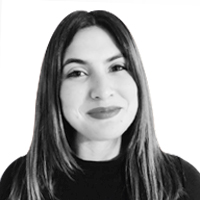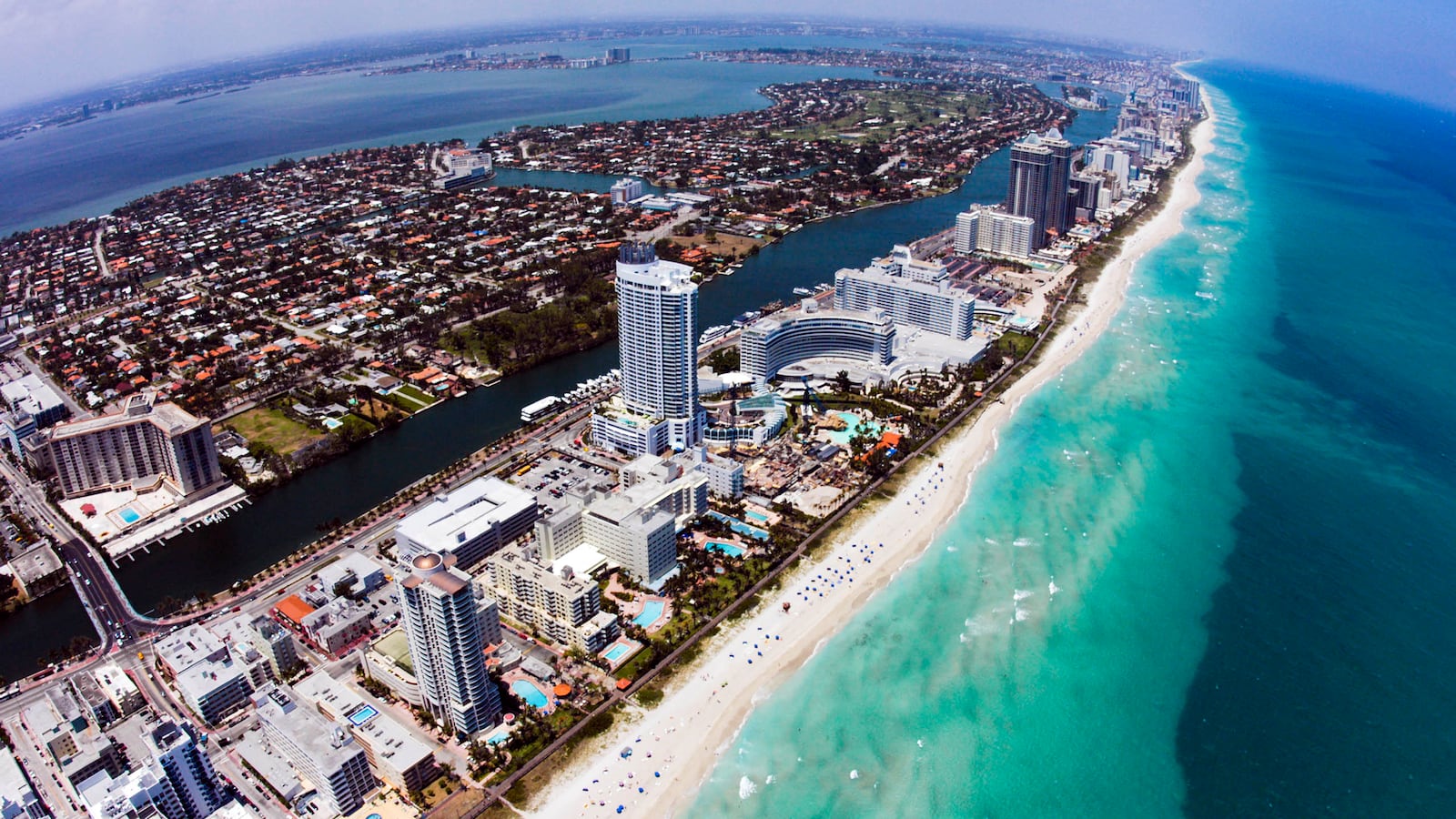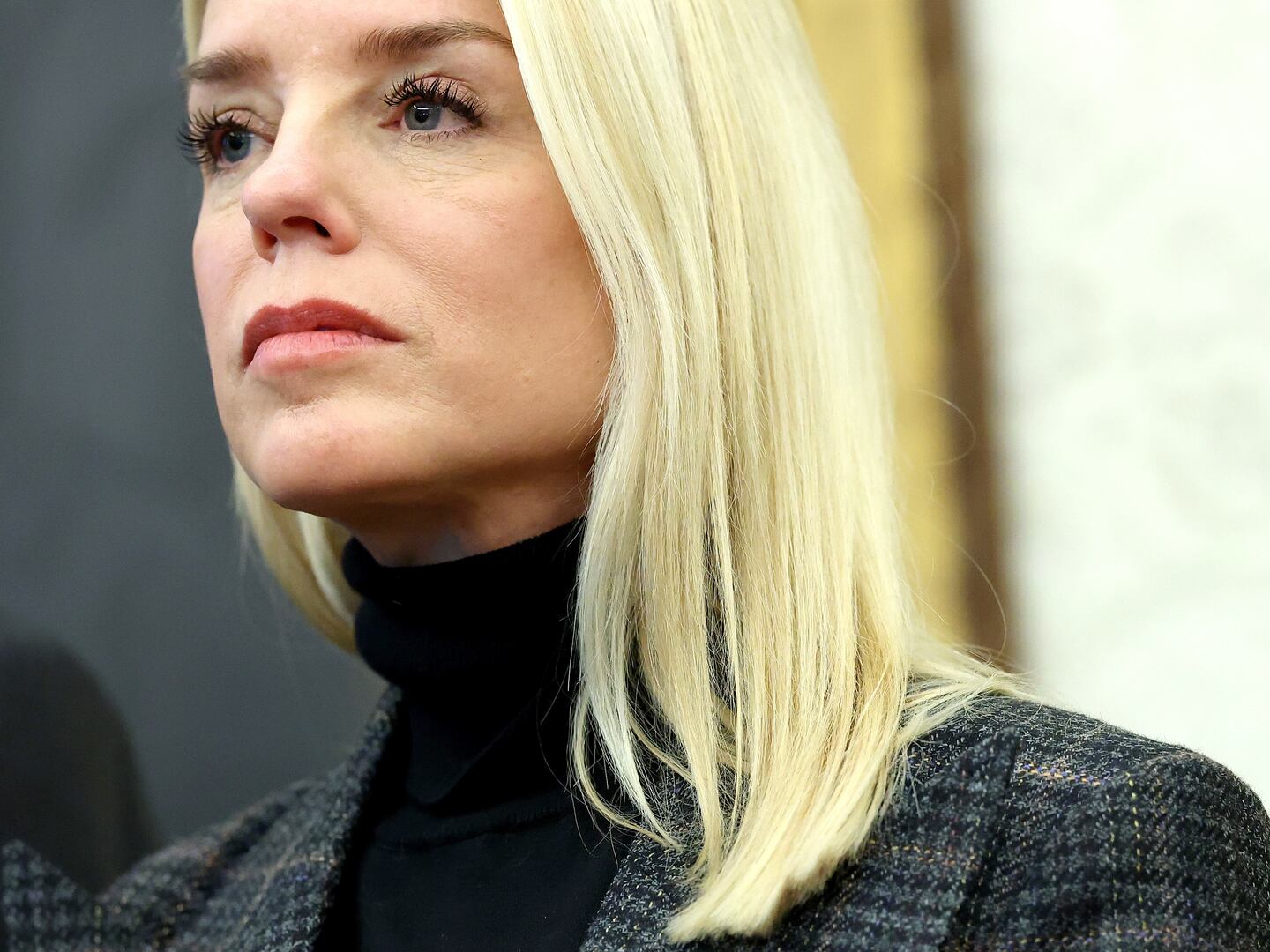Bounded by the Miami River to the south and Interstate 95 on the east, Allapattah—derived from the Seminole Indian-language word meaning “alligator”—is the largest working industrial area in Miami-Dade County. There are clothing wholesalers, upholstery shops, and tailors (or costureras, as my grandma calls them) galore. The Goodwill Superstore is here, for crying out loud, but locals still look at you suspiciously when you mention you stopped for a cafecito in the area. Even Hialeah—made famous by Trina, Trick Daddy and Pitbull lyrics—doesn’t carry the same stigma.
Allapattah is probably not a place that’s familiar to you, let alone one you’d be able to pick out on a map. But I know it well. This Miami neighborhood is where my mother spent her childhood and then the beginning of her marriage. My grandma has lived in the same duplex since 1972. She and my grandfather bought the house with money saved up from teaching, driving a school bus and other odd jobs. There are no Jennies From the Block that have come out of this ’hood, just lots of stray dogs that are neither menacing nor very friendly. I grew up fascinated by them. My grandfather always said it was thanks to him I was fearless when it came to animals.
This neighborhood has a past and present, no doubt. According to Area Vibes, Allapattah’s crime rate is 48 percent higher than the national average. It most certainly has hope for a bright future, though. Its heart beats louder now thanks to a handful of millennial-ish locals who’ve decided to open stores here. It’s still an affordable part of town, at least in comparison to the skyrocketing rents just down the street in Wynwood, where mom and pop businesses are being priced out and replaced by the likes of Scotch & Soda, Aesop, and Le Labo. And for visitors to Miami who want to experience the city’s lesser known history, have some damn good coffee and avoid the masses, this part of town might be just the place to explore while getting away from all of Miami’s stereotypes.
Kristen Royo, of vintage shop Mills Vintage, and I have a lot in common. Her grandma grew up in Allapattah and her aunt got married at Corpus Christi Catholic Church, where my grandma volunteers a few days a week. “I think as a community it has so much potential to really become a district that harbors small businesses and artists. I know change can be both positive and negative,” she said. “It’s allowed us to open a small business, but for others it may lead to a loss of community and displacement.”
Same goes for Diane Perez of Brooklyn Vintage & Vinyl. Though she just happened upon the space that now houses her shop, her family had previously lived in Allapattah for 23 years.
“Thank the universe for putting me in the right place and time when it did,” she said. A trip to the tattoo shop and hair salon proved serendipitous when she realized there was an empty space in the same complex calling her name. “The day I saw it I knew right then and there I’d be quitting my job and never looking back.”
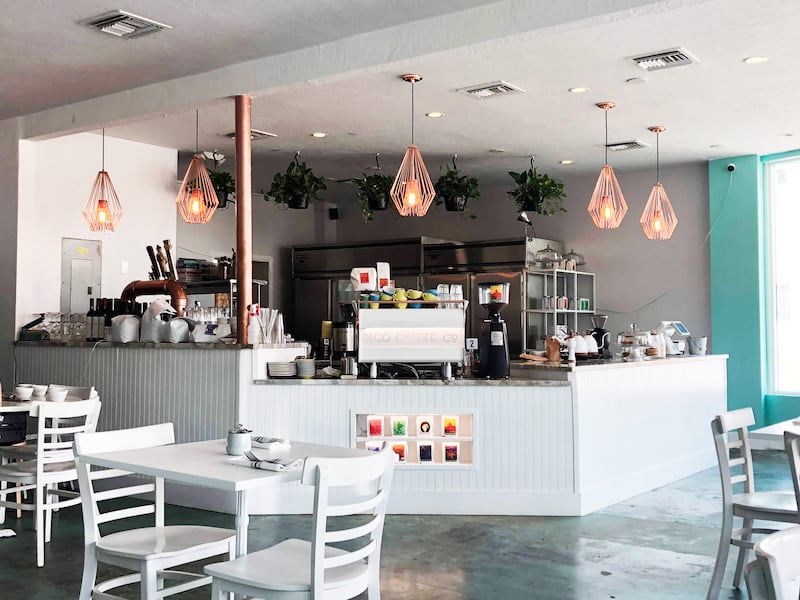
Deco Coffee
Allison RamirezFor the newest business in town, a much needed coffee shop and restaurant, it’s less about history and more about practicality. Though Deco Coffee Co.—a merger between Relentless Roasters’ Daniel Choiseul Paguaga, Andre Villarreal and Kevin Gonzalez, and Threefold Cafe’s Nick Sharp—kept Miami Beach and a real refined, clean Art Deco feel in mind when creating the brand and searching for a storefront, the partners also needed natural gas for their coffee roaster.
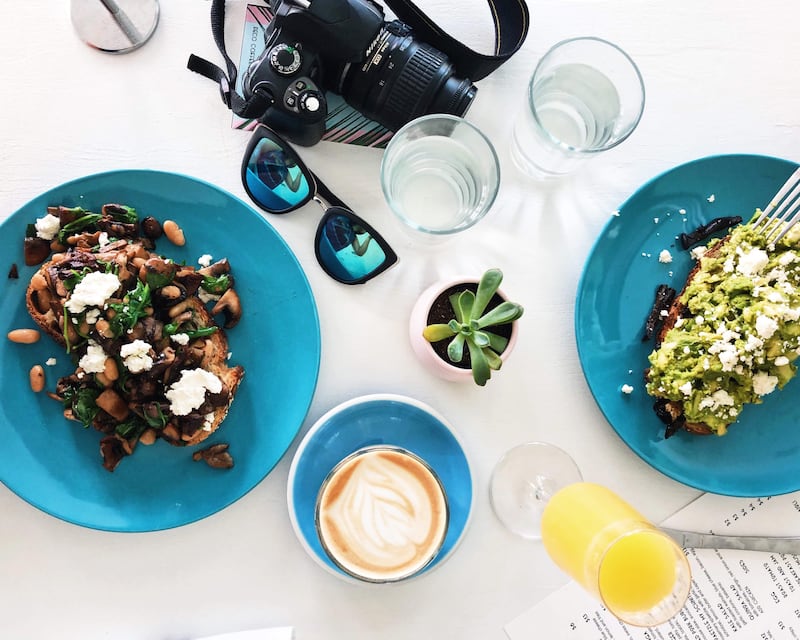
Deco Coffee
Allison Ramirez“Honestly, we kind of stumbled upon Allapattah,” said Choiseul. “One of the only places in Miami that seemed to have a couple of potential units with natural gas was here.”
Lower East Coast—a music, magazine and apparel shop in the area—opened in Allapattah less than a year ago during Art Basel. The store’s owners Steven Sanz and Rees Escobar, both in the music industry, along with creative director Jon Rodriguez, wanted to create a space that brought together their interests, which include fashion, design, youth and street culture.
“We were drawn to the area because of its historical significance and how central it is to the heart of Miami,” said Sanz. “Growing up in Miami we were really inspired by the sports history in Allapattah. The shop is close to the original site of the Miami Stadium.”
But not for long. LEC seems to have outgrown Allapattah and fast. The shop, which stocks indie brands like Stray Rats (Miami), Bedlam (Japan), Onyx Collective (NYC) on the apparel side and zines from various independent artists worldwide, is relocating to the Design District soon.
“We’re grateful to have launched LEC in Allapattah,” Sanz tells me in an email. “It was a great place for us to build our community and has allowed us to position ourselves for more growth in Miami. We can’t wait to see how the neighborhood continues to evolve.” He also hopes, like I do, that the history of Allapattah is preserved in the process.
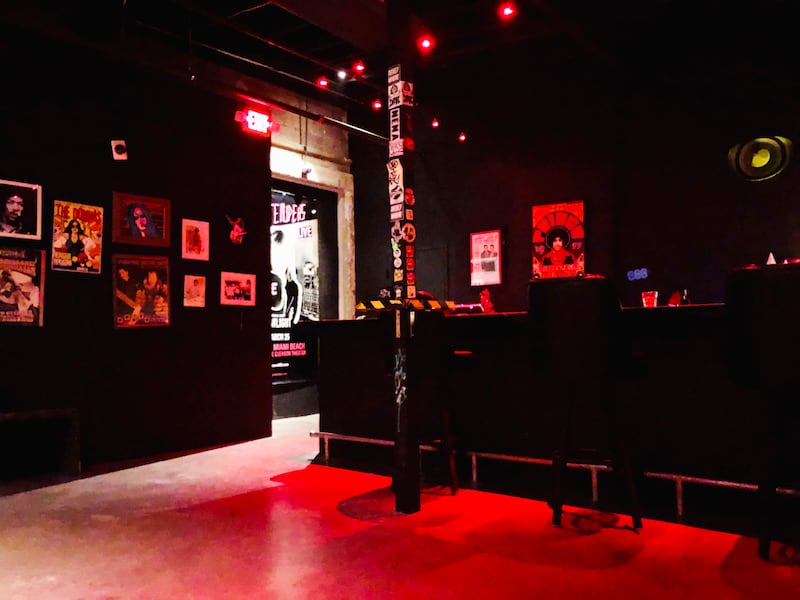
Las Rosas
Allison RamirezThen there’s Las Rosas, the daddy of them all. This sprawling corner bar brings in live music acts from all over the country most days of the week, hosts a weekly spoken word event, a monthly queer rock and roll dance party and drag show—the only one like it in the city—and is a hassle-free spot for the 21 and over crowd to pop in for a drink. You could say this bar was the pioneer of new Allapattah, and music lovers from all walks of life have taken notice.
Some businesses, though, like Allapattah Market (from the same owners as Las Rosas) and Jackson Hall (a health-focused food hall) have been unsuccessful. Allapattah Market opened its doors in February 2017 — an open-air, dog-friendly concept with local vendors including food, a florist, and custom jewelry—and closed shortly after due to permitting issues. Another business owner came in months later trying to revive the space as a popup and no dice, but the massive sign (oddly indistinguishable in terms of font and general aesthetic from the one at Seattle’s more than 100-year-old Pike Place Market) remains.
Through triumphs and failures, all of these businesses have one thing in common: they’ve opened within the last two years, firm believers in a neighborhood that hasn’t made it on the map quite yet.
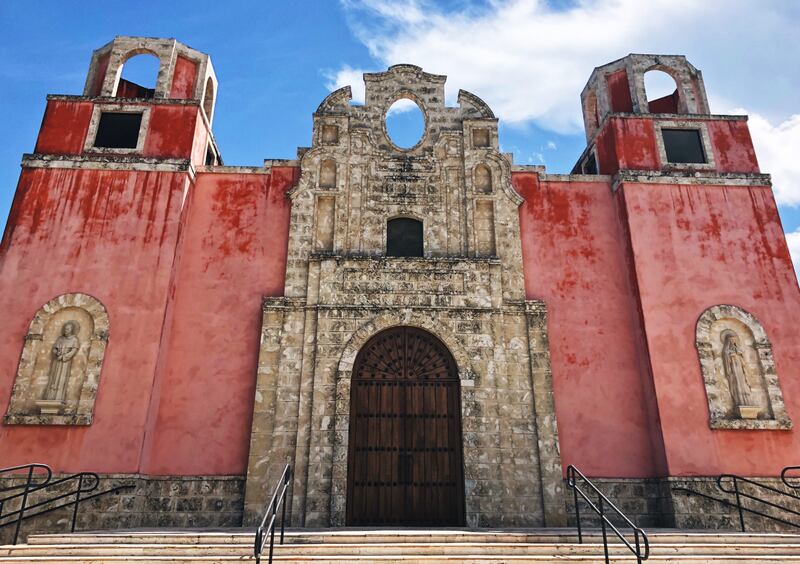
La Merced
Allison RamirezEven the churches are undergoing transformation, deeply rooted in preservation, not gentrification. And by churches, I mean one church specifically. Allapattah’s shining star has lofty goals and a vision for what the area could become. At Corpus Christi, one priest has taken it upon himself to educate the public about Latin American and European Baroque art as well as Florida’s Hispanic history. You can find everything you want at the church’s Chapel of La Merced (a gallery and event space collaboration between Corpus Christi and a couple Florida International University faculty members), minus prostitution and drugs, says Father Jose Luis Menendez on a semi-private tour set up by my abuela. Almost everything you touch is gold, 23.5 karat to be exact, and nothing—I mean nothing—is an imitation. This is not the Smithsonian, but it’s a damn good alternative.
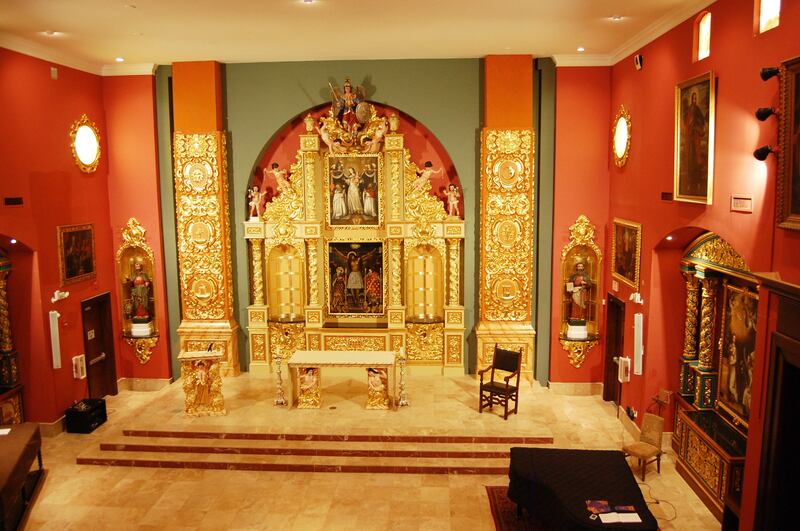
La Merced
Allison Ramirez“When we don’t know people, we’re afraid, and fear breeds violence,” Father Menendez says in Spanish, as he walks us through the chapel. His goal for Allapattah is that locals eventually embrace the neighborhood and stop by La Merced for a coffee or a glass of wine on the way to or from Wynwood. The stunning museum space is an ongoing project, 13 years in the making, with a library of close to 8,000 books, an original Cuban constitution and art pieces and sculptures from the 13th, 14th and 15th centuries as part of its collection.
A word of advice from Menendez: Don’t listen to what the papers have to say. Allapattah has a longstanding stigma for being dangerous and scary. But to him, a shining pearl like this one doesn’t exist anywhere else. It’s a place for Hispanic Americans and everyone to enjoy, regardless of race, social class or preconceptions, and we’ll probably be singing (or rapping?) about it in 10 years’ time.
